
"Remember the Hyphens"

Travel-With-Your-Kids.com © 2014 Travel-With-Your-Kids.com
Links | Terms and Conditions | Share with us! | Sign-Up for our newsletter!




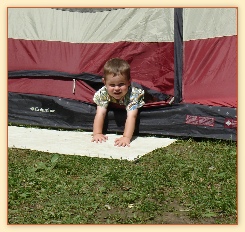
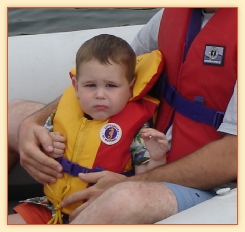
Best Family Tent
Get some friendly tips on how to choose the best tent for your family.
Water Safety Tips
Read some great suggestions on keeping your kids safe by the water.












What are you waiting for?

Choosing the Best Tent
Don't let anyone tell you choosing the best tent for your family is something to be taken lightly. The perfect weekend you have been dreaming of with cheerful children rising to bacon sizzling while Mom and Dad greet them with a hug, can quickly turn into a battle of "Kids vs Parents: Battle of the Temper Tantrum".
Getting a good night's sleep for EVERYONE is critical in the success of any adventure with kids. Knowing what to look for in a tent is a great place to start. There are a few important things to evaluate. Make your decisions, and it will help you quickly evaluate what tents on the market will be the best tent for your family.
Price:
Price is not the most important factor to consider, but it does drive most families' decisions, so best to get it out of the way first. Tents range in price and quality together. Keeping in mind if your budget allows a low-, middle-, or high-range of quality & price will quickly narrow down your search. Hopefully going through some of the following points will help you decide if it is worth it to choose the range you want, or if it is worth it to look at something more (or less) expensive.
Frequency of Use:
Plain and simple, how often are you planning on using your new tent? Keep this in mind when deciding what price range you are planning on looking at.
If the mid-winter dream in your mind is the ideal family campout every weekend, but in reality you have never tented in your life and can't stand the thought of using an outhouse, then spending $1000 on a tent is probably put to better use elsewhere.
However, if you are already an avid outdoor family and want to turn your day hiking trips into weekend adventures every month, then you may wish to spend more than $100 to ensure you do not need to replace your investment next year.
Climate:
This is a HUGE factor. If you are camping in temperate climates, such as only in the summer, or if it never drops below 60F/15C, then you will be able to get away with a cheaper-quality tent.
Add humidity, hot or cold temperatures, wind, or rain and your needs go up substantially. Consider each of these items on a spectrum. The greater any one (or all) of the items is in your future, the more you will want to aim for a higher quality tent.
Weight and Transportation Size:
Consider the future transportation of your tent to make this decision. If you are car camping, or will be transporting your goods in your pickup truck, then a heavier tent that does not travel as compactly will be perfectly fine.
If you plan on hiking, canoeing with portages, or are limited in your vehicle transportation space, then look for a lightweight, compact tent.
If you have the space to handle a less-compact tent, this is one place to put good consideration. Highly compact tents require near-perfect folding skills to replace them back in their packaging. Less compact tents allow for a simpler folding technique. This can be a HUGE lifesaver when trying to include children in the setup & takedown of the campsite.
Durability:
This is a tough one to talk about. We all want a good quality, highly durable product without having to pay a fortune to get it.
Unfortunately with tents, this simply isn't the case. Tougher fabrics - especially if you need lightweight AND tough fabrics - are simply more expensive. If you need a highly durable tent, you will need to pay for it.
If you will be including pets in your tenting, consider spending more on durability or you may have a new front door the next night there is a raccoon outside your tent.
There are a few areas other than fabric quality that separate poor quality from good quality tents. Watch for:
Zipper strength - It is nearly impossible to replace/repair a tent zipper in a cost-effective manner
Pole strength - chains inside the structural poles vs cheap elastic inserts, for example.
Fly quality - Watch the plastic "windows". They can dry and crack in the sun causing big problems later.
Seam stitching - Do NOT overlook this one! Durable stitching plus overlapping fabrics are a must to keep you dry.
Waterproof:
I would love to tell you that whatever tent you purchase will be 100% waterproof when you take it home. But I am an honest person.
Unless you are purchasing a top-end tent with a warranty and an additional service offered to ensure its waterproofness, assume your new tent will NOT be completely waterproof when you bring it home. Plan to do this as part of your maintenance BEFORE you head out for that first memorable weekend.
Ease of Setup:
If there is one area that separates the worst from the best, this is probably it. I have seen tent instructions so complicated and steps so intricately involved, it takes a small group of engineers to assemble it.
If you want your kids to be involved, or if you want to not turn into the Wicked Witch of the North while you set it up, make this a high priority.
The one place you may find there is a balance to ease of setup, is if the tent you choose is larger with various wings/rooms. The more complicated the basic layout, the more difficult it will be to assemble.
Keep in mind too, the more complicated the assembly instructions, the more likely you will forget from year-to-year "how it all worked last year". If you find yourself with a mind-blowing installation, make sure you keep your instructions in a waterproof, safe location so that next year you are not headed for divorce as you attempt to recreate last year's 'best camping trip ever' while little Johnny attempts to start the campfire alone.
Size and Layout:
This is the point where you ask yourself "How many people will be sleeping in my tent?" It is important to note at this point when understanding tents, that a 6-man (or 8-, or 4-) sleeps exactly 6 people. Orientation of the sleepers is decided by the manufacturers, and it gives you just enough space for that many adult-sized sleep mats.
If cold temperatures are a concern for you, it is highly recommended that you only use the minimum space needed for your party. The greater the space, the more air that needs to be kept warm overnight, and the harder you will have to work to keep warm.
You will also not want any larger than you need if lightweight for backpacking is a high concern.
If extreme temperatures or mountain climbing are not in your expedition plan, then aim for one size larger than you think you need. A good rule of thumb for basic family tenting, is buy a tent that is 2-men larger than how many people you are.
This goes for babies and pets too. So, if you are a family of 4 plus a baby, plus Rover, aim for an 8-man tent.
Features:
Here is where personal taste comes in. Some tents offer separate "rooms" with sheets that hang from the ceiling for privacy. Some also offer separate "wings" which can give kids their own space should an unplanned rainy day need to be spent in the tent.
A "Pet room" can often zipper off so when the dog is wet, he can't come in and crawl all over your warm, dry beds.
Shoe 'foyers', front mats, nightlights, plus a never ending array of interior storage options for you to choose from, are just some of the various tents features designed to set one tent apart from another.
I have put this section last because each one of these features affects price, weight, ease of setup, size, and often durability. (The more 'features', the more things there are to break)
So, we have gone over all the things to consider, but what's next? How do you know when you walk into the store what you are looking at? Well, unfortunately tent manufacturers and stores have made it as difficult as possible for you to know what you're getting into before you buy it.
What?!? Really?!?! Yes. More than any other purchase we have ever made, tent purchases are the time when you are given the least information possible, you are rarely allowed to touch them in advance (remember the zippers?), and warranties are horrible.
Upper end sports stores and camping supply outfitters are the one place you should be able to touch, try, and get competent information about before purchasing.
Once you have evaluated the criteria above, if you decide you are looking for higher quality and price, I wholeheartedly encourage you to head to an outfitting store and test drive various models. This is by far the best way to choose a tent
If all stores offered this, there would be a lot less need for a website for this.



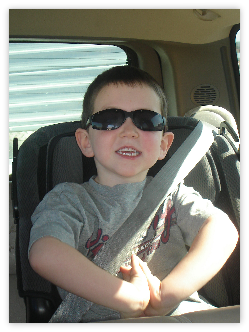 << Back to Camping
<< Back to Camping

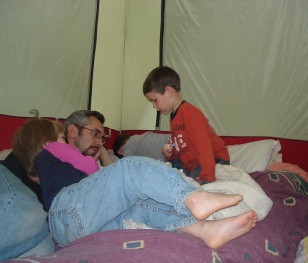
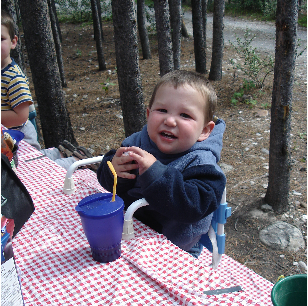
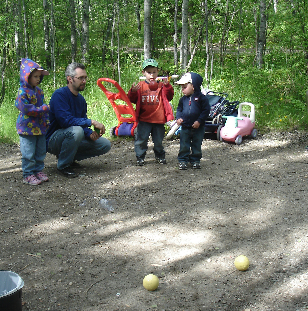
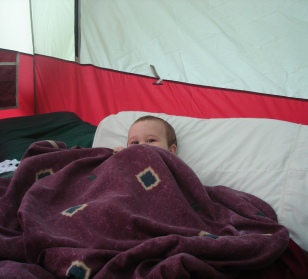
| Water Safety |
| Water Safety Tips |
| Destinations |
| Outings |
| Camping |
| Kids' Reviews |
| Help & Support |
| Childrens Discovery Museum of the Desert |
| Childrens Disovery Museum Kids Reviews |
| Choosing a Tent |
| Lynnie |
| AJ |
| Nick |
| Matt |
| Belle |